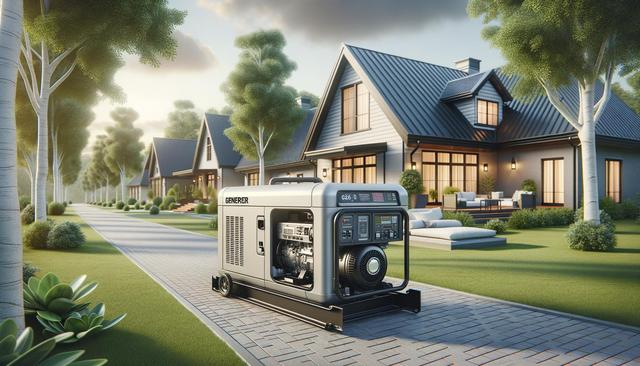Understanding the Role of Home Generators
Home generators play a vital role in maintaining comfort and security during unexpected power outages. Whether due to storms, maintenance, or grid overloads, power interruptions can disrupt daily life, impact home appliances, and compromise safety. Using a Generator For Residential Use ensures that essential systems like lighting, heating, refrigeration, and medical devices continue functioning without interruption. With increasing awareness of energy resilience, more homeowners are exploring options that go beyond just backup power—choosing models that integrate efficiently into their energy management systems.
Generators come in various types and capacities, making it important to match the right system with your household’s energy needs. For instance, Whole House Generators Installed offer seamless transitions during outages, automatically detecting power loss and activating within seconds. These generators are typically wired into the home’s electrical panel, allowing for continuous operation of all vital systems without manual intervention. Choosing the appropriate generator depends on several factors, including fuel type, energy load requirements, and noise levels.
Types of Home Generators to Consider
When evaluating generators for home use, it’s essential to understand the different types available and how they serve various needs. The most common categories include:
- Portable Generators: Suitable for temporary use, often powered by gasoline or propane.
- Standby Generators: Permanently installed units that provide automatic backup during outages.
- Inverter Generators: Known for cleaner power and quieter operation, ideal for sensitive electronics.
- Backup Solar Powered Generators: Eco-friendly options that store energy from solar panels for use during blackouts.
Caterpillar Generator options span many of these categories, offering solutions that are engineered for durability and performance. These generators are recognized for their reliability and are often used in both residential and commercial settings. Homeowners looking for sustainable energy alternatives might also consider integrating solar-powered units with battery storage, particularly in regions with frequent outages or unstable grids.
Installation and Maintenance Insights
Proper installation and maintenance are crucial for ensuring long-term performance from any home generator. For systems like Whole House Generators Installed, professional installation is highly recommended. This involves site assessment, electrical integration, and adherence to local building codes. Choosing certified installers ensures compliance with safety standards and optimal system configuration. In contrast, portable models require less installation effort but still benefit from a clear setup plan and safe storage practices.
Regular maintenance is key to generator longevity. Basic upkeep routines include:
- Checking and changing oil and filters
- Inspecting fuel lines and connections
- Testing battery levels
- Running periodic system diagnostics
Most Generator For Residential Use units come with user manuals detailing maintenance schedules. Advanced models may also feature remote monitoring to alert homeowners of needed service or performance issues. Whether using a Caterpillar Commercial Generators model or a smaller inverter unit, establishing a maintenance routine ensures readiness when you need it most.
Energy Independence and Sustainability
Incorporating generators into home energy strategies not only enhances reliability but can also support sustainability goals. Backup Solar Powered Generators are gaining popularity as environmentally conscious alternatives. These systems store excess solar energy during the day and release it during outages, reducing reliance on fossil fuels and lowering utility costs. For homeowners aiming to reduce their carbon footprint, combining solar panels with backup battery systems offers a greener path to energy independence.
Moreover, some generators can be integrated with home automation systems, enabling smart energy management. Features like remote control, load prioritization, and consumption tracking allow users to optimize usage based on real-time data. This kind of integration pairs well with Caterpillar Generator models that are designed for both performance and adaptability. As energy efficiency becomes increasingly important, generators that align with renewable energy systems and smart home technologies are becoming more attractive to tech-savvy homeowners.
Choosing the Right Generator for Your Home
Selecting the right generator involves evaluating your household’s specific needs, budget, and long-term energy goals. Key considerations include:
- Power capacity: Determine which appliances and systems need backup
- Fuel type: Options include diesel, propane, natural gas, or solar
- Noise level: Important for urban or noise-sensitive environments
- Installation complexity and cost
- Maintenance requirements and warranty coverage
Brands like Caterpillar Commercial Generators are known for their rugged design and consistent performance, making them a solid choice for those seeking durability. However, homeowners should consult with energy professionals to assess their property’s electrical layout and determine the most efficient solution. Whether opting for manual-start portable units or investing in Whole House Generators Installed, the goal is to ensure comfort, safety, and continuity during power disruptions.
Conclusion: Empowering Your Home with the Right Generator
Investing in a home generator is a proactive step toward enhancing energy resilience and protecting your household from unexpected disruptions. Whether you’re considering Backup Solar Powered Generators for sustainability or a robust Caterpillar Generator for long-term reliability, understanding your options allows you to make informed decisions. With thoughtful planning and professional guidance, you can seamlessly integrate a Generator For Residential Use that aligns with your energy needs and lifestyle. As technology advances and energy infrastructure evolves, having a dependable generator is more than a convenience—it’s a smart safeguard for modern living.




Leave a Reply